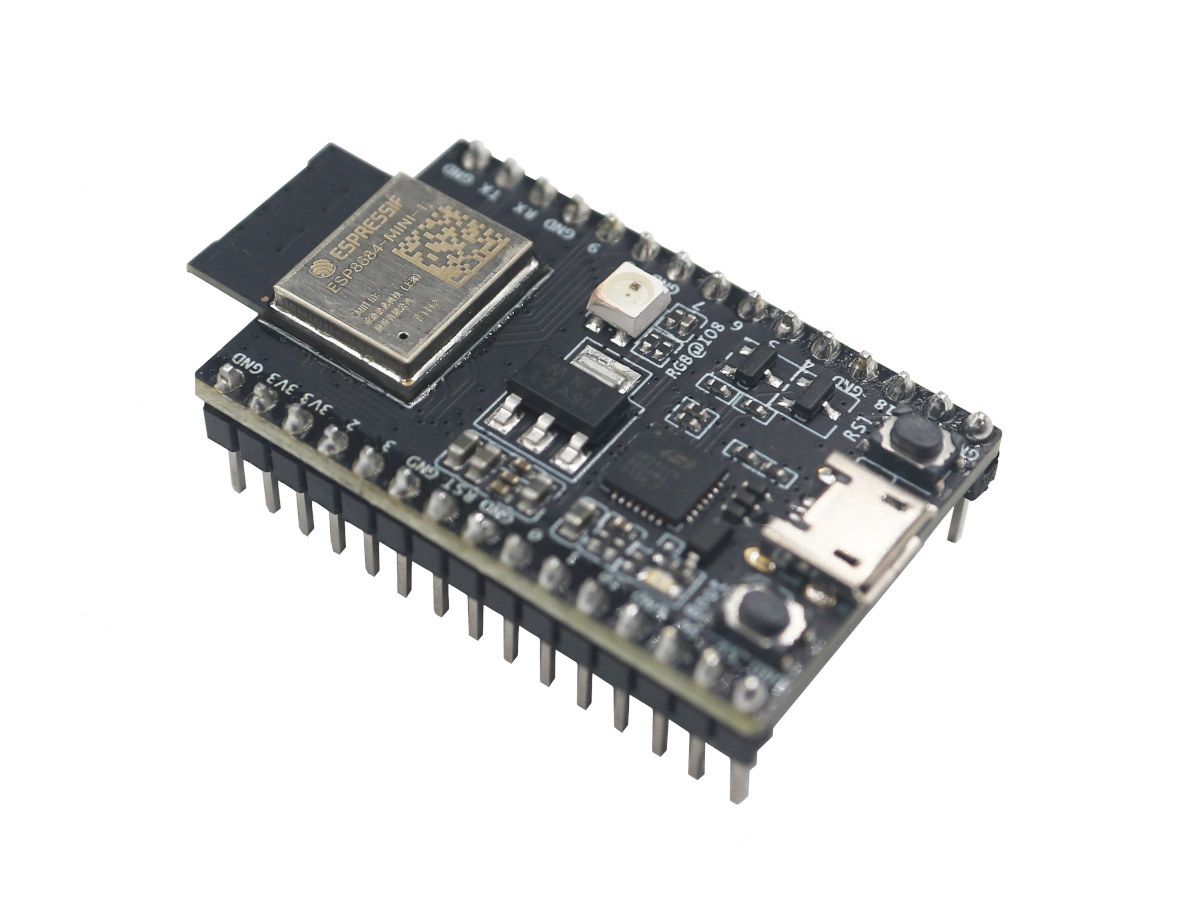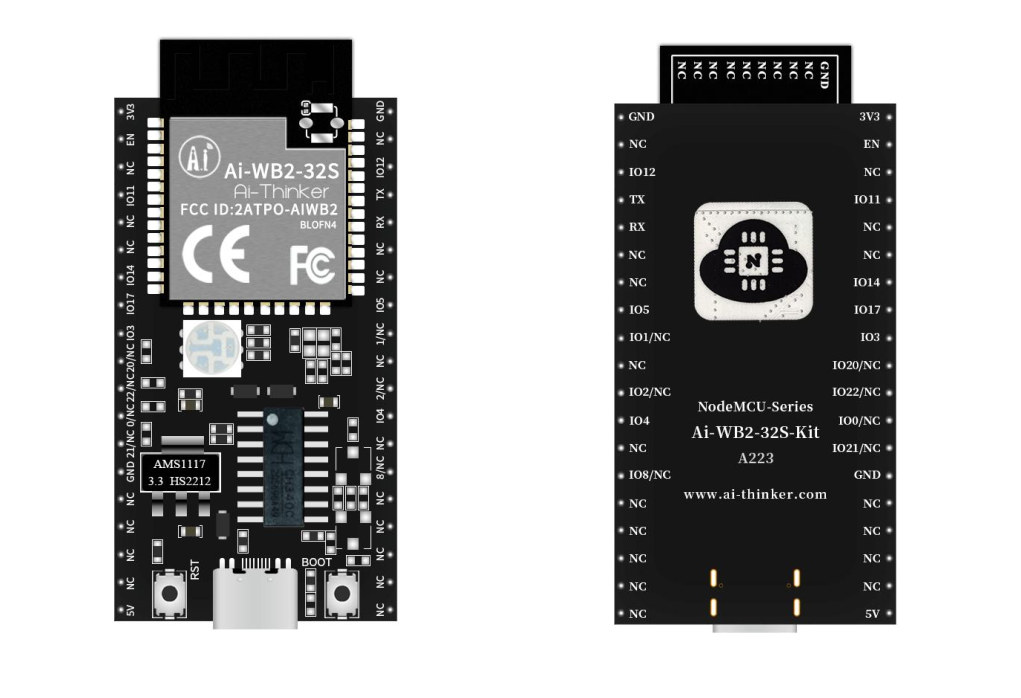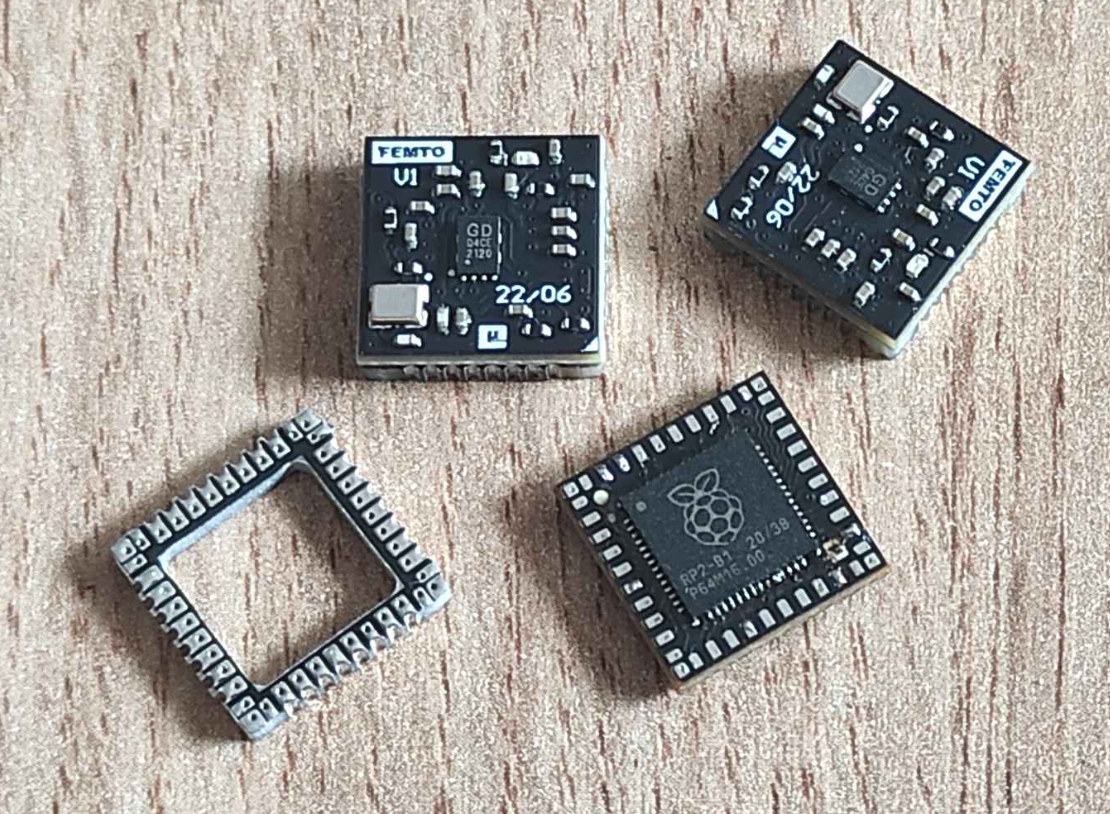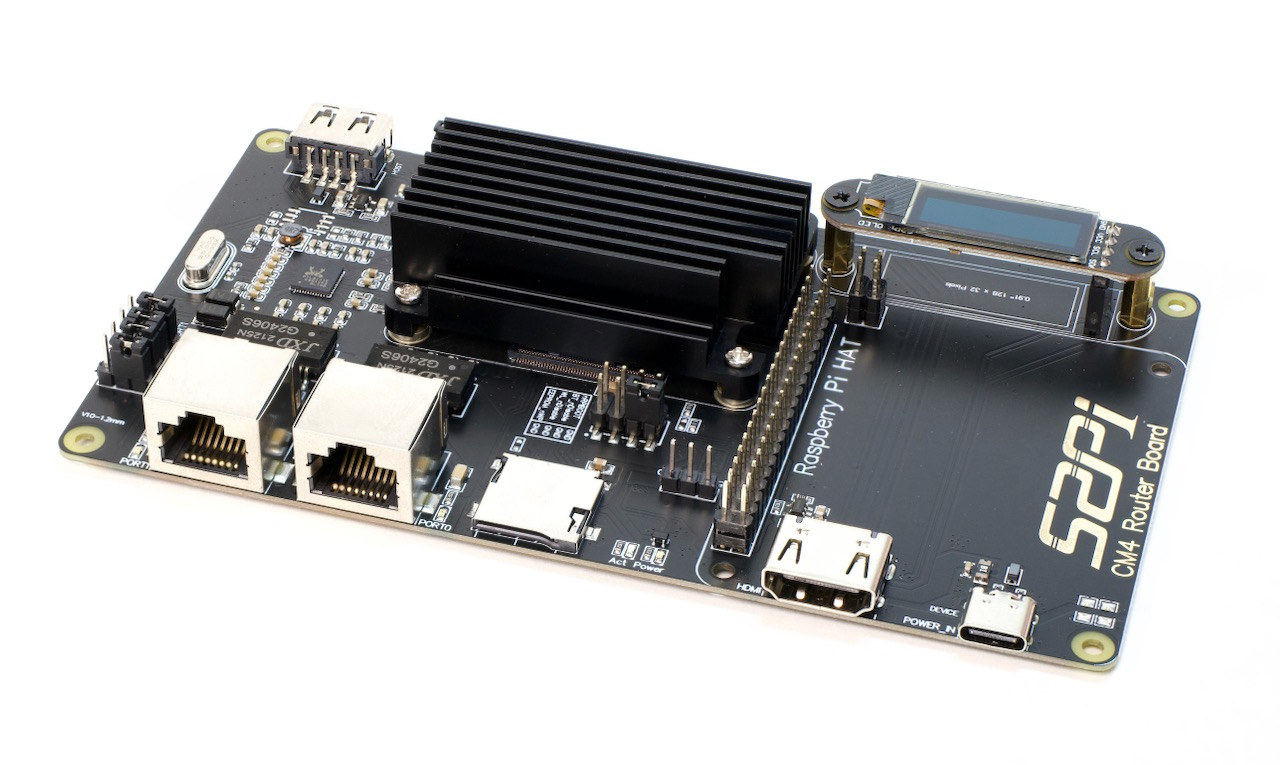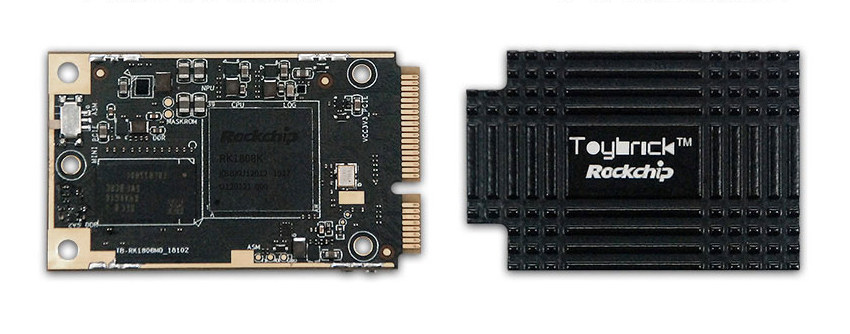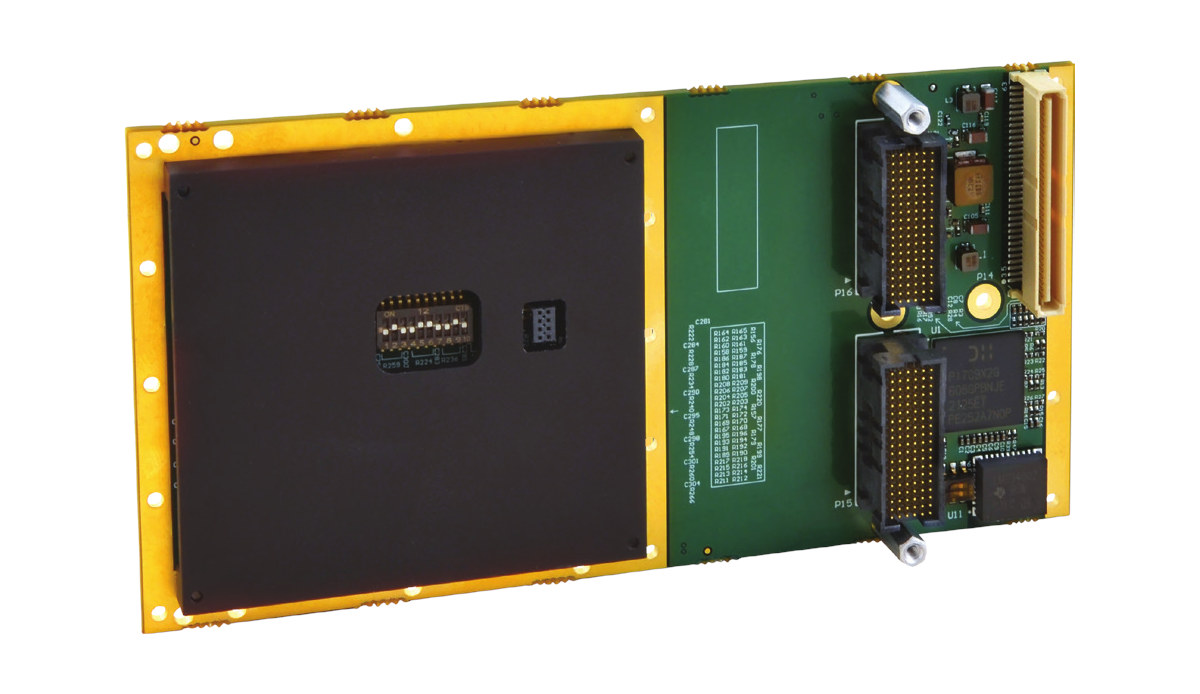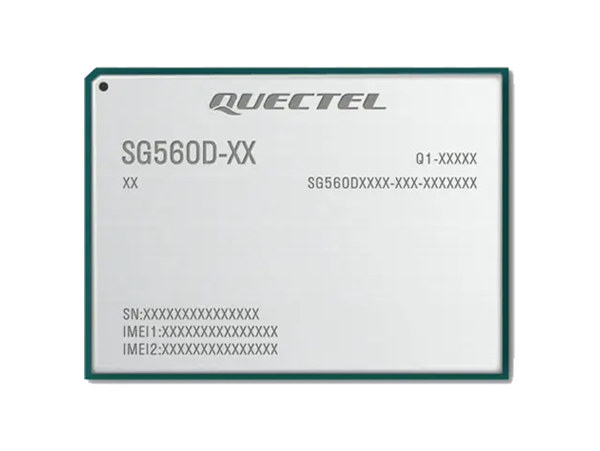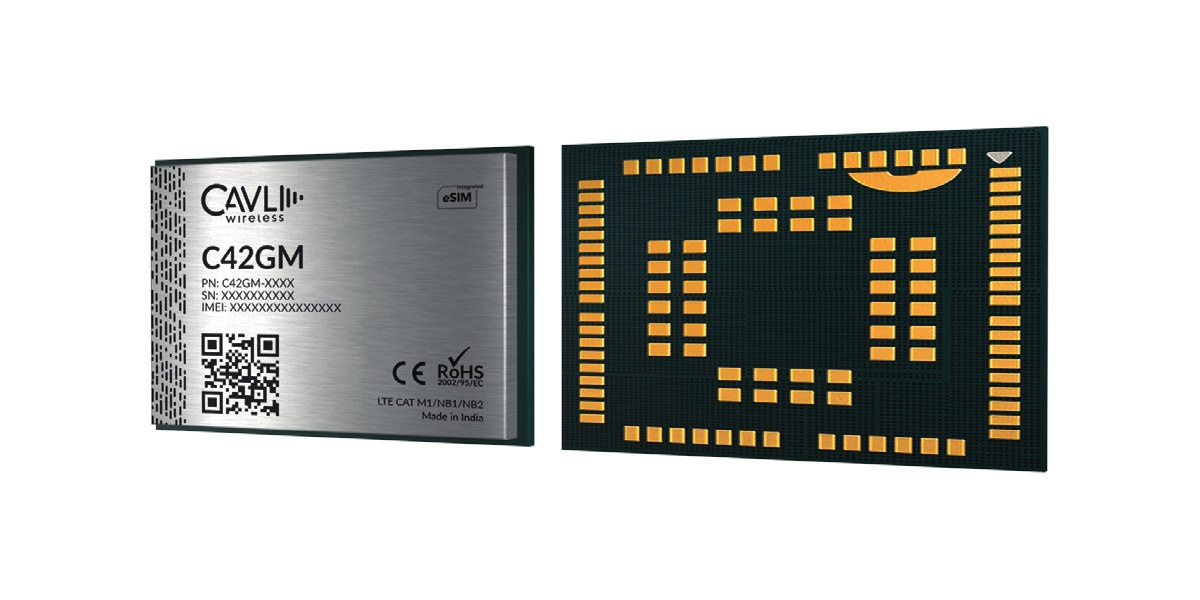Espressif Systems ESP8684 is a single-core RISC-V microcontroller with 2.4 GHz WiFi 4 and Bluetooth 5.0 LE (BLE) connectivity that also integrates 1, 2, or 4MB flash into a tiny 4x4mm QFN package. The SoC is listed under the ESP32-C2 product family on the Espressif website and can be found in MINI and WROOM modules, as well as the ESP8684-DevKitM-1 development kit. All three parts, namely ESP8684H1, ESP8684H2, and ESP8684H4, are designed to work in the -40 to 105°C temperature range, ESP8684 specifications: CPU – 32-bit RISC-V processor up to 120 MHz; 305.42 CoreMark; 2.55 CoreMark/MHz Memory – 272 KB SRAM (16 KB for cache) Storage – 576 KB ROM, 1 to 4MB flash (SiP) Wireless 802.11 b/g/n-compliant WiFi 4 1T1R Up to 72.2 Mbps link rate Support for 20 MHz bandwidth Station mode, SoftAP mode, Station + SoftAP mode Wi-Fi Multimedia (WMM) Antenna diversity Bluetooth 5 LE up to […]
AI Thinker Ai-WB2 modules feature BL602 RISC-V MCU with WiFi and BLE connectivity
AI Thinker has just introduced a new family of wireless IoT modules with the Ai-WB2 equipped with Bouffalo Lab BL602 RISC-V microcontroller offering both 2.4 GHz WiFi 4 and Bluetooth 5.0 LE connectivity. There are ten different modules to choose from, probably to keep mechanical and electrical compatibility with ESP8266 and ESP32 modules, and the company expects customers to integrate those into Internet of Things (IoT) products, mobile devices, wearables, Smart Home appliances, and more. Ai-WB2 modules share the following specifications: Wireless MCU – Bouffalo Lab BL602 32-bit RISC-V microcontroller @ up to 192 MHz with 276KB SRAM, 2.4 GHz WiFi 4 and Bluetooth 5.0 LE connectivity Storage – 2MB or 4MB SPI flash WiFi range – Up to about 500 meters (typical) I/Os – SDIO, SPI, UART, I2C, IR receiver, PWM, ADC, DAC, and GPIO (except Ai-WB2-01S with just UART/PWM/GPIO/ADC) Power Supply – 2.7V to 3.6V > 500mA Power […]
Femto is a tiny 12x12mm Raspberry Pi RP2040 module
Mirek Folejewski has designed the ridiculously tiny Femto module based on the Raspberry Pi RP2040 microcontroller with a size of just 12x12mm, and still including an SPI flash, a crystal, and a few passive components. We’ve previously covered some really tiny RP2040 boards with the Pimoroni Tiny 2040 and Adafruit QT Py RP2040 boards, as well as the RP2040 Stamp module, but the 12x12mm Femto module is about a quarter of the size of 25x25mm RP2040 Stamp. Femto specifications: MCU – Raspberry Pi RP2040 dual-core Cortex-M0+ microcontroller @ up to 133Mhz with 264kB of SRAM Storage – 4 to 64Mbit QSPI flash I/O – 30 GPIO pins, Reset and BOOTSEL signals, etc… exposed through a frame (See below) Misc – Status LED, 12MHz crystal oscillator, decoupling capacitors Dimensions – 12 x 12mm The board is comprised of two parts: the module itself (aka mainboard) with the Raspberry Pi RP2040 microcontroller […]
52Pi CM4 Router Board also features HDMI, 40-pin Raspberry Pi HAT header, and OLED display
We’ve already seen compact Raspberry Pi CM4 based router boards with two Ethernet ports from DFRobots, Seeed Studio, and MCUZone. 52Pi CM4 Router Board expands on the same principle but also offers HDMI output, a 40-pin GPIO header for Raspberry Pi HAT expansion boards, and a small OLED information display. The board also includes two Gigabit Ethernet, plus the WiFi and Bluetooth connectivity from the Raspberry Pi CM4, and the extra features make the board larger (146x50mm) than competitors. But that makes the platform that much more flexibly, and can be used as a gateways for all sorts of projects thanks to the wide range of Raspberry Pi HAT available in the market. 52Pi CM4 Router Board (EP-0146) specifications: Compatible with Raspberry Pi Compute Module 4 series Storage – MicroSD card slot (only used with Raspberry Pi CM4 Lite) Video Output – HDMI 2.0 port up to 4Kp60 Display – […]
mini PCIe module features Rockchip RK1808K SoC with 3.0 TOPS NPU
Rockchip RK1808 SoC with a built-in 3.0 TOPS AI accelerator has been around since 2019, and we’ve seen it in USB compute sticks, SBCs, and even in Pine64 SoEdge-RK1808 SO-DIMM module, but somehow never in the more widely used M.2 or mPCIe form factors. Toybrick TB-RK1808M0 changes that and offers Rockchip RK1808K SoC coupled with 1GB RAM and an 8GB eMMC flash in a mini PCIe module that exposes USB 3.0, USB 2.0, UART, and GPIO signals. Toybrick TB-RK1808M0 specifications: SoC – Rockchip RK1808K CPU – Dual-core Cortex-A35 processor @ up to 1.4 GHz AI Accelerator – 3.0 TOPS NPU for INT8 inference (300 GOPS for INT16, 100 GFLOPS for FP16) VPU – 1080p60 H.264 decode, 1080p30 H.264 encode System Memory – 1GB DDR Storage – 8GB eMMC flash Host interface – Mini PCIe edge connector with USB 3.0, USB 2.0, UART, and GPIO Misc – Heatsink for cooling Supply […]
Acromag XMC-7A50-AP323 – An XMC module based on AMD Xilinx Artix-7 FPGA
Acromag XMC-7A50-AP323 is an XMC (Switched Mezzanine Card) module based on a Xilinx Artix-7 FPGA with 48 TTL I/O channels plus a 16-bit ADC for 20 differential or 40 single-ended analog inputs. Designed for commercial off-the-shelf (COSTS) applications, Acromag XMC modules are RoHS compliant, and suitable for automation applications, scientific development labs, as well as aerospace and military applications. Acromag XMC-7A50-AP323 module specifications: FPGA – AMD Xilinx Artix-7 (XC7A050) FPGA with 52,160 logic cells, 65,200 Flip flops, 2,700 kb block RAM, 120 DSP slices Storage – 32Mbit QSPI flash memory FPGA Digital I/O 48x I/O channels controlled in groups of eight channels, 5V tolerant TTL, RS485, and LVDS interface options: Build Option A: 24x EIA-485/422 channels Build Option B: 24x TTL and 12x EIA-485/422 channels Build Option C: 24x LVDS channels Analog Input 20 differential or 40 single-ended inputs Flexible scan control 16-bit A/D resolution 8μs conversion time FIFO buffer […]
Quectel SG560D 5G & WiFi 6E module runs Android 12, targets AIoT applications
Quectel SG560D is a 5G Sub-6GHz & WiFi 6E module for AIoT applications that runs Android 12 on a Qualcomm QCM6490 SoC with an octa-core Kryo 670 64-bit Arm CPU and a Qualcomm Adreno 643L GPU. The SG560D module is equipped with 4GB LPDDR4X RAM and 64GB UFS storage by default, supports up to 2520×1080 MIPI display at a refresh rate of 144Hz, and can deliver up to 14 TOPS for AI inference. Quectel SG560D key features and specifications: SoC – Qualcomm QCM6490 octa-core processor with one Kryo 670 Gold plus high-performance core up to 2.7 GHz, 3x Kryo Gold cores at 2.4 GHz, 4x Kryo Silver low-power cores @ 1.9 GHz, Adreno 643L GPU, 6th gen AI Engine delivering up to 14 TOPS, up to 4Kp30 H.265/H.264 video encode, 4Kp60 video decode; 6nm process. System Memory – 4GB LPDDR4X by default Storage – 64GB UFS flash by default Display […]
Cavli Wireless C42GM module offers cellular IoT and Sigfox connectivity, optional GNSS and CAN Bus
Selecting an LPWAN IoT module usually means selecting a particular LPWAN standard, but Cavli Wireless C42GM global IoT module combines LTE Cat M1 and NB-IoT (NB1/NB2) cellular IoT connectivity with Sigfox for “use cases that need the hybrid LPWAN approach”. The module also comes with optional GNSS for asset tracking and/or time synchronization and there’s also a variant that adds CAN FD wired communication. The C42GM module can also be fitted with an eSIM (embedded SIM) pre-loaded global connectivity. C42GM module specifications: LPWAN Cellular (NB-IoT and eMTC) Bands Supported – LTE Bands: B1/B2/B3/B4/B5/B8/B12/ B13/B18/B19/B20/B25/B26/B28/B66 3GPP Release: LTE 3GPP E-UTRA Release 13 CAT M1/NB1/NB2 (Upgradable to Release 14) Download & Uplink Speed LTE Cat M1 – 1119Kbps (UL), 588Kbps (DL) NB1 – 60Kbps (UL), 20Kbps (DL) NB2 – 158.5Kbps (UL), 127Kbps (DL) Optional eSIM Optional Sigfox GNSS – GPS, GLONASS, Beidou I/Os – 1x USB2.0, 2x UART, 1x USIM, 9x GPIO, […]


